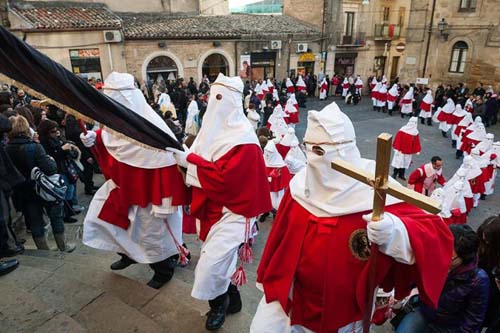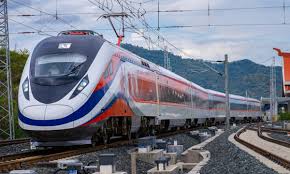Italy: Celebrating Easter

Rome: Easter in Italy has always been celebrated by traveling, and who among us doesn’t yearn for a trip right now? This year, it seems Italians are dreaming of slow, eco- conscious escapes, traveling by train rather than any other means. Their favorite destination? The sea of course.
Easter is a perfect time to return to the water. The holiday, after all, is rooted in the idea of rebirth. With a stroke of luck in the weather, in addition to lying in the sun, you might also be able to take your first dip of the season. For beaches close to Rome take a look at our suggestions here. A cult classic we will never stop loving are vacations on the Amalfi Coast, and Easter – before the crowds arrive – is a decidedly perfect time to discover its villages and sea.
But beware, rain is notorious for ruining Easter plans in Italy. Bad weather is common between March and April and seems to rebel against any enjoyment of games, wine and fun outdoors, becoming a running joke for Italians. Nonetheless, the tradition of the Easter picnic is alive and well in Rome, and with a plethora of parks to choose from, why not indulge in a sweet slice of Colomba cake with friends – scenic backdrop of ancient Roman aqueducts included. Check out our guide to the most famous parks in Rome if you’re looking for ideas.
Easter vacation for students is from Thursday 14 April through Tuesday 19 April, so expect more crowded airports, train stations, and roads over these five days. Also, be aware that destinations around Rome will be more crowded than usual. The Bomarzo: Park of monsters and the Garden of Ninfa, for example, are popular Easter weekend jaunts.
Food plays a leading role in Easter celebrations in Italy. There are eggs, a symbol of perfection and new life, and wheat, which is reborn from the earth every year; there are lettuces and vegetables, which announce spring, and ricotta cheese, emblem of purity; there is bread, a food with deep Christian symbolism; and there is lamb, the victim without sin.
Generally speaking, lamb is more commonly found on the table in central and southern Italy than in the north. There are also many different ways of cooking lamb according to different regions: “aggrassato”, rich in garlic, potatoes, pecorino cheese and wine, is a Sicilian dish, with cacio cheese and eggs is a recipe found in Abruzzo, or simply abbacchio “a scottadito”, grilled, in Lazio.
However, barbecues across Italy will serve up sausages, bruschetta, burgers and arrosticini aplenty. Keep in mind that many restaurants in Rome will close for Easter Sunday and Monday, so definitely book ahead if you are planning on checking something off your culinary wishlist over the weekend. Although you should be able to find places that serve lunch or dinner, most likely it will be a set menu or take away box.
For many cultures they are a symbol of birth. But, closed, they look like stones, like the rock that closed Jesus’ sepulcher. And, like the rock would have opened on the day of the resurrection, eggs hatch to let out a new life. Traditionally, eggs are served hard-boiled, as an ingredient in savory pies, or accompanied by cold cuts (the dish called “il Benedetto” is widespread in many areas of southern Italy). Eggs are also an ingredient found in the dough of tagliatelle and ravioli, tortelli and cappellacci, first course traditional pasta dishes.
Easter eggs as a symbol of this holiday have ancient origins. In fact, they date back to the custom of early Christians who painted eggs red, in memory of the blood of Christ, and decorated them with crosses or other symbols. This tradition spread in the Middle Ages as an auspicious gift and the eggs were wrapped with leaves or colored flowers.
Over the centuries the convention led to the creation of artificial eggs, initially only among nobles and aristocrats, made of precious materials, such as the famous Fabergé eggs. The first chocolate eggs were created in the eighteenth century, and only became customary in the twentieth century, modernized with a gift inside.
The Easter Bunny is unheard of in Italy. Traditions for children vary between regions. In Sardinia, for example, children are given a seven-legged doll made of bread, called Sa pippia. For each day of the Holy Week, the children have to detach a leg, so they also learn to count the days of the week.
Absurdly large chocolate eggs, which sometimes contain toys, are the greatest treat for Easter in Italy. Cafés and pastry shops display the colorful confections wrapped in decadent ribbon, looking almost too beautiful to eat. We recommend buying them, along with the dove- shaped Colomba (symbol of peace), from a bakery or bar. They cost more, but are usually much better than the prepackaged supermarket offerings. That being said, if you are attending an Easter lunch with kids, Kinder eggs with a surprise hidden inside always go over well.
The Luneur Park in Rome has a schedule of Easter Egg Hunts for all age groups over Easter weekend. Tickets for the popular egg hunts can be purchased at the same time as entry tickets to the theme park.
On Monday, April 18, the 25th edition of the Grandi Giardini Italiani Botanical Treasure Hunt returns with an event dedicated to children, to bring them closer in a playful and joyful way to the immense botanical, artistic and cultural heritage preserved in the gardens throughout Italy. To discover the list of participating gardens click here.
If you would like to attend the Vatican Palm Sunday Mass, arrive at St. Peter’s Square early and be prepared to stay for an extended period of time. The Blessing of the Palms, Procession and Mass for Palm Sunday are held in the morning, starting at 10:00 am, in St. Peter’s Square. Although this event is free, the square is usually very crowded and it can be difficult to gain admission.
Holy Thursday Mass will be held in St. Peter’s Basilica at 9:30 am. A papal mass is also celebrated in the Basilica of San Giovanni in Laterano, Rome’s cathedral, usually at 5:30pm.
On Good Friday, the papal mass at the Vatican in St. Peter’s Basilica begins at 5:00pm. As with other papal masses, admission is free but tickets are required and can be obtained from the Papal Audience website.
The Stations of the Cross ritual, or Via Crucis, presided over by the Pope returns to the Colosseum. After two years of the Stations of the Cross taking place in St. Peter’s Square without the public in attendance due to the pandemic, the ritual during which the Pope visits each of the 12 Stations of the Cross will be at 9.15pm in the picturesque setting of the Roman Forum.
The Stations of the Cross were placed at the Colosseum in 1744 by Pope Benedict XIV, and the bronze cross in the Colosseum was erected in 2000, the Jubilee year. For the event, a huge cross illuminates the sky while the stations of the cross are described in different languages. At the end, the Pope gives a blessing. This is a very moving and popular procession. If you go, expect large crowds and be aware of escape routes as in any crowded tourist spot. This event is free and without covid restrictions.
On Saturday, 16 April, Pope Francis will celebrate the Easter Vigil Mass at 7:30pm in the Vatican at St. Peter’s Basilica. As with other Papal Masses, free tickets must be obtained from the Papal Audience website. Although there are thousands of attendees inside St. Peter’s (the basilica can accommodate 15,000), this is still one of the most intimate ways to experience a Papal Mass at Easter. Because you must go through security to enter the basilica, plan to eat a late lunch/early dinner and arrive several hours before Mass begins.
The Easter Mass will again be in St. Peter’s Square, at 10:00am. The square can hold up to 80,000 people and will be full up until Easter morning. The mass is free to attend, but tickets are required. They must be requested months in advance through the Papal Audience website. Even with tickets, your place on the square is not guaranteed, so you must arrive early and expect to wait, standing, for several hours.
At 12:00pm the “Urbi et Orbi” blessing will occur from the Central Loggia, or balcony. Participation here is free and unregulated, but only those who arrive early and wait will have a chance to get close to the blessing.





